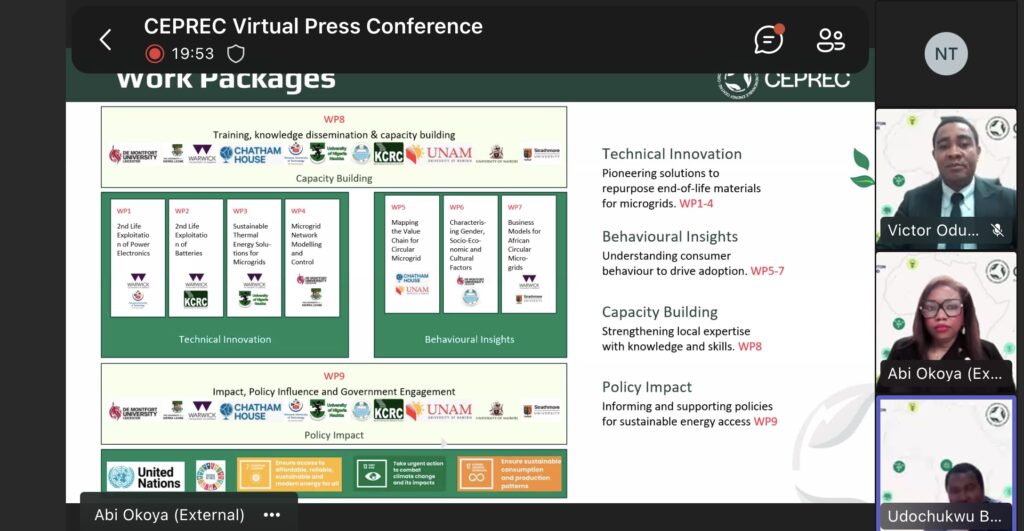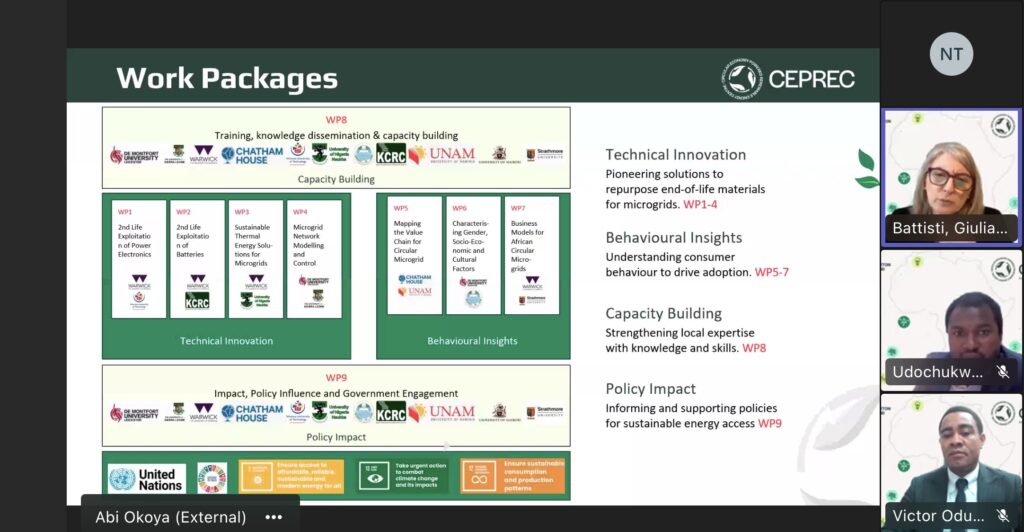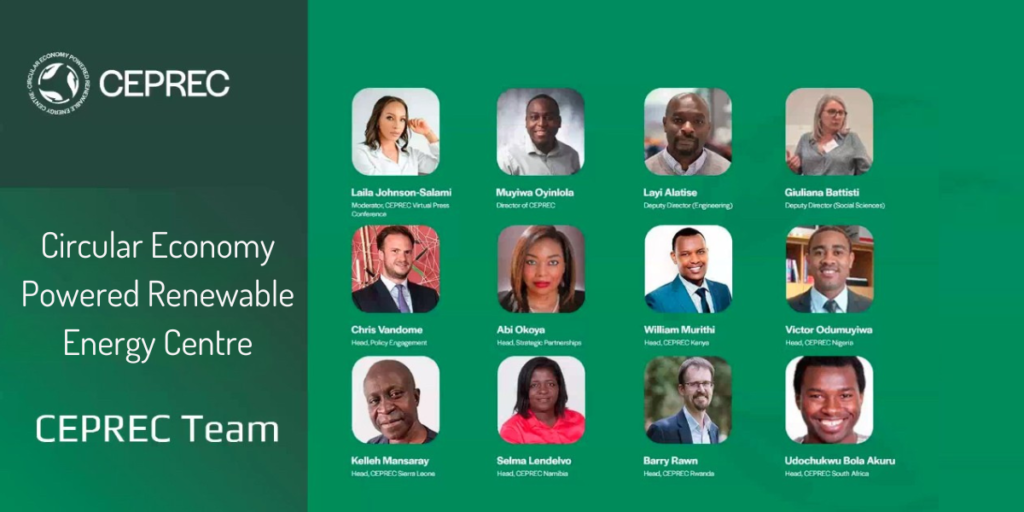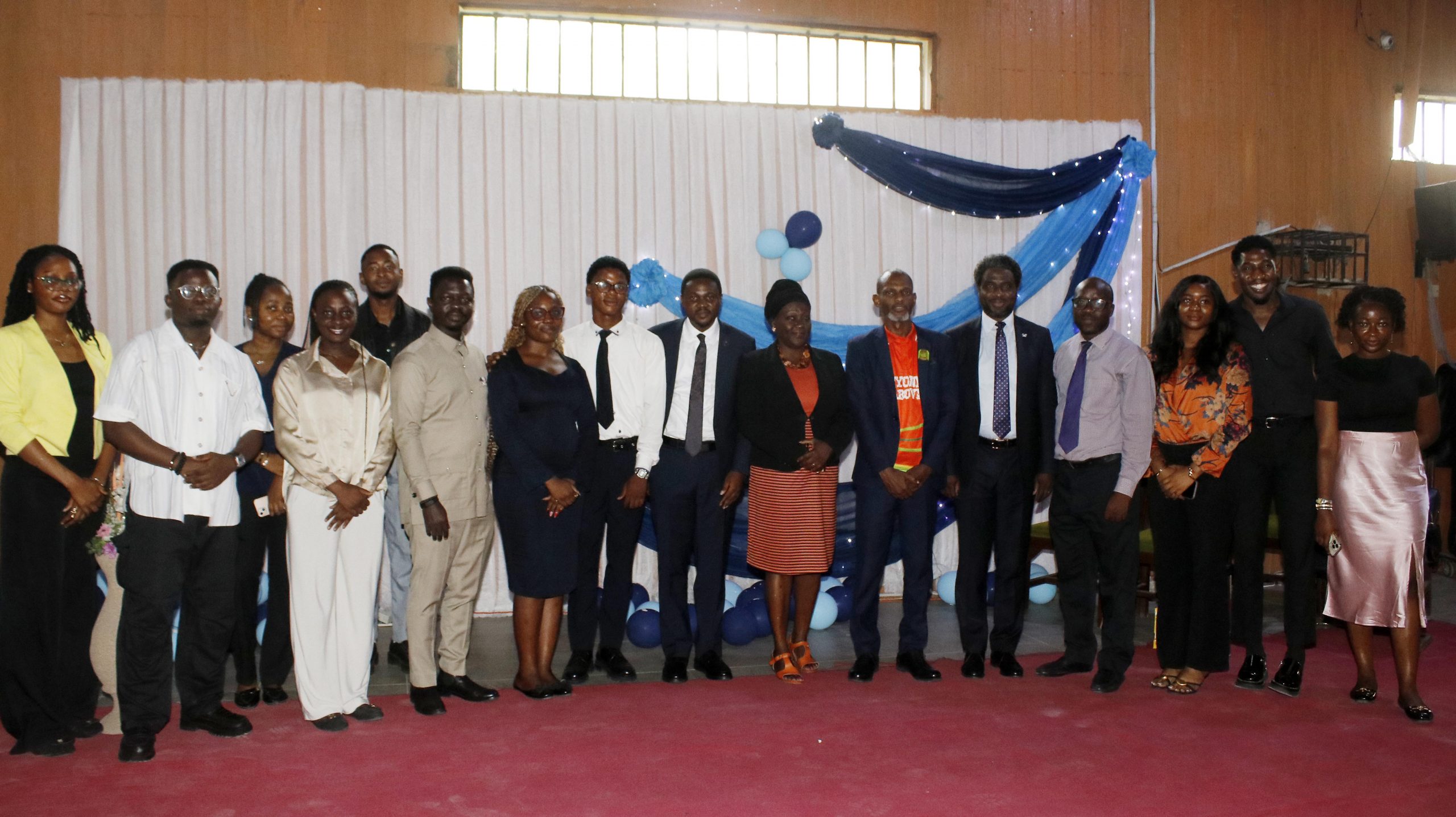The University of Lagos (UNILAG) has solidified its role as a key player in Africa’s energy sector by joining a ground-breaking initiative, named Circular Economy Powered Renewable Energy Centre (CEPREC). Valued at £3.5 million, CEPREC, which was officially launched on Monday, February 10, 2025, during a virtual press conference, is funded by the United Kingdom (UK) Government’s Ayrton Fund.
It brings together eleven (11) institutions from Africa and the United Kingdom to pioneer sustainable, affordable and scalable renewable energy solutions across the continent. The 11 institutions are: De Montfort University, the University of Warwick, Chatham House in the UK, Strathmore University (Kenya), the University of Lagos (Nigeria), University of Namibia (Namibia), University of Sierra Leone (Sierra Leone), Kigali Collaborative Research Centre (Rwanda), Tshwane University of Technology (South Africa), the University of Nairobi (Kenya), and University of Nigeria (Nigeria).
UNILAG, leading activities in Nigeria, will play a pivotal role in advancing clean energy research, influencing policy, and driving real-world impact.
A Vision for Energy Sustainability: What CEPREC Aims to Achieve
Beyond being a research centre, CEPREC is a strategic movement targeted at leveraging circular economy principles to address three critical areas of Africa’s energy future:
- Creating New Knowledge: CEPREC aims to do this by conducting cutting-edge research to revolutionize renewable energy solutions.
- Building Capacity: The Centre is poised to train local experts and communities to implement and maintain energy systems.
- Influencing Policy: Partnering with governments to create policies that attract investment and scale impact.
To achieve these, CEPREC is adopting the Triple Helix Model, which fosters collaboration among academia, government, and industry to accelerate innovation and policy implementation.
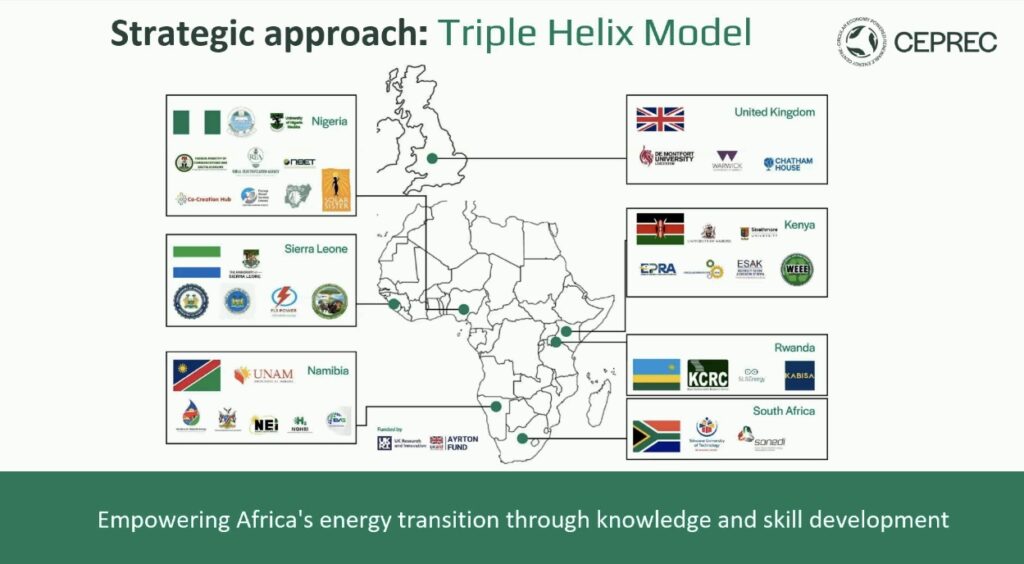
UNILAG’s Role: Leading Innovation in Nigeria
As a member of the Pan-African CEPREC Consortium, UNILAG is leading efforts in Nigeria through an interdisciplinary team of experts, including:
- Dr. Victor Odumuyiwa (Department of Computer Sciences) – Country Lead for the Project
- Dr. Osita Omeje (Department of Electrical/Electronic Engineering)
- Dr. Obiageli Okoye (Department of Sociology)
- Dr. Folakemi Ajayi (Department of Economics)
Powering the Future: CEPREC’s Innovative Solutions
One of CEPREC’s most innovative approaches is repurposing electric vehicle (EV) components. Studies show that up to 60% of life remains in EV batteries even after a vehicle is retired. Instead of discarding these components as e-waste, CEPREC is developing technologies to repurpose them into energy storage systems for homes and communities, ultimately:
- Lowering energy costs,
- Reducing electronic waste, and
- Expanding electricity access to underserved communities.
Additionally, CEPREC is focusing on off-grid and grid-connected microgrids to provide reliable and affordable energy solutions for rural and urban communities alike. The goal is to:
- Deliver cost-effective and sustainable energy to remote villages using Off-Grid Solar Microgrids.
- Strengthen weak grids and integrating renewable energy into national grids using Interconnected Microgrids.
Beyond Technology: Prioritising Real People in Africa’s Energy Transition Matters
CEPREC recognizes that energy solutions must work for real people, and thus need to be affordable, culturally relevant, and financially sustainable. In view of this, the initiative is focusing on:
- Ensuring microgrids are built and managed sustainably
- Understanding consumer behaviour to increase adoption of renewable energy
- Developing financially viable models for businesses and local communities
Identifying Challenges, Proposing Solutions, Driving Impact
The Circular Economy Powered Renewable Energy Centre (CEPREC) is designed to tackle real-world problem-solving. The initiative has identified three major challenges in Africa’s energy sector and is implementing targeted solutions to drive measurable impact:
| Challenges | CEPREC’s Solutions | Anticipated Impact |
| There is a growing e-waste problem across the world. | CEPREC intends to extend the lifecycle of microgrid components by using circular economy principles. | It is anticipated that this will result in less waste, lower costs, and cleaner energy for communities. |
| There is lack of data on consumer energy behaviour. | The Centre aims to conduct household surveys and behavioural studies to create a data-driven energy strategy. | It is envisaged that this solution will inform policy-making, influence smarter investments, and will lead to targeted interventions. |
| Energy has been found to attract high costs and low investments. | To solve this, CEPREC is developing scalable business models that ensure profitability and sustainability. | It is predicted that this move will attract more private-sector investment, local job creation, and long-term growth. |
Bridging the Gap Between Innovation and Real-World Impact with Policy
A critical factor in Africa’s energy transition is policy development. Inadequate policies often hinder innovation and deter investment. To bridge this gap, CEPREC is:
- Partnering with policymakers to shape regulations that foster growth.
- Providing data-driven resources to help governments and industries make informed decisions.
- Advocating for circular economy principles to be integrated into national energy policies.
CEPREC’s Work Packages: A Holistic Approach to Energy Transition
To effectively tackle the various dimensions of Africa’s energy crisis, CEPREC has divided its research and implementation into four key focus areas:
- Technical Innovation – Repurposing end-of-life materials for microgrids. (Work Packages 1-4). This is to be handled by the University of Warwick, Tshwane University of Technology (South Africa), Kigali Collaborative Research Centre (Rwanda), University of Nigeria, Nsukka (Nigeria), De Montfort University and University of Sierra Leone.
- Behavioural Insights – Understanding consumer behaviour to improve adoption. (Work Packages 5-7). This is to be handled by Chatham House in the UK, University of Namibia, De Montfort University, University of Lagos (Nigeria), University of Warwick and Strathmore University (Kenya).
- Capacity Building – Strengthening local expertise through training. (Work Package 8). This will run across all the eleven (11) collaborating institutions.
- Policy Impact – Developing frameworks to scale renewable energy access. (Work Package 9). This will run across all the eleven (11) collaborating institutions.
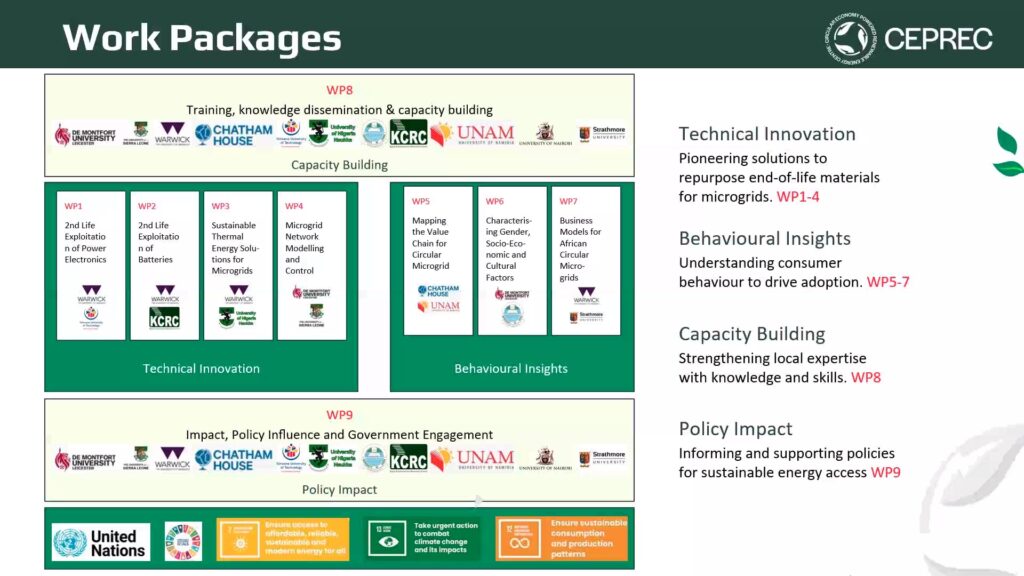
The Road Ahead: A Transformative Initiative for Africa’s Future
The work has only just begun. In the virtual conference attended by about one hundred and forty (140) stakeholders and pressmen, Abi Okoya, Head, Strategic Partnerships, CEPREC, informed that CEPREC, being first of its kind, will in the coming months, roll out pilot projects, knowledge-sharing initiatives, and policy frameworks to drive Africa’s energy transition.
With UNILAG at the forefront in Nigeria, the launch of CEPREC marks a bold step towards a cleaner, more resilient, and more inclusive energy future for Africa. Dr. Victor Odumuyiwa, Acting Director, NITHub, University of Lagos and the Country Lead for CEPREC in Nigeria, expressed the University’s readiness to collaborate with individuals, institutions, industries and government agencies in actualising the goals of CEPREC.
Click here —> CEPREC Official Launch Press Release, to view the official press release, issued after the press conference, detailing CEPREC’s vision, goals, and next steps.
Stay connected to UNILAG’s official channels for updates on CEPREC’s impact and milestones through UNILAG’s lens! You are welcome to also visit the official website for CEPREC —> https://www.ceprec.co/ for more detailed information.
Author: Nike Ogunshakin
Article Editor: Adejoke Alaga-Ibraheem
